#type: criticism
Explore tagged Tumblr posts
Text
If there’s one thing I hate in a book it’s when a series is entirely from the protagonist’s perspective, then has one or two chapters from another character’s point of view, and the only thing they think or talk about is the protagonist.
It’s so exhausting, and it makes the world feel so small. You’re telling me this character has no life outside of the main protagonist? Nothing else to think about at all?
#writing#writeblr#writer#writers#aspiring author#writers on tumblr#author#writing advice#authors#critique#crit#criticism#books#bookblr#writing tips
22 notes
·
View notes
Text
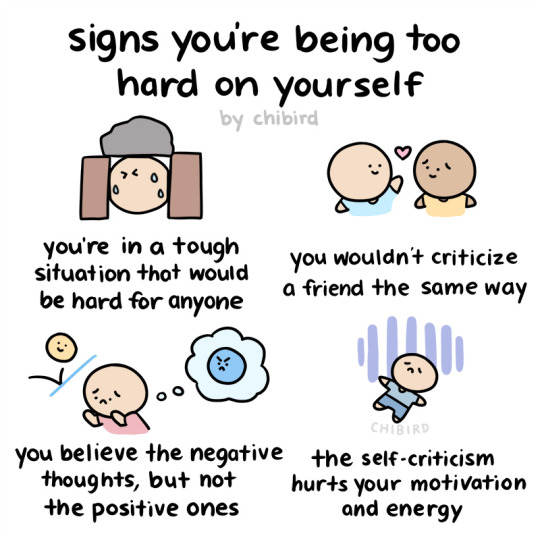
It's normal to be hard on yourself, because you want to do the best you can and accomplish everything, even when your time or energy is limited. However, sometimes the criticism towards yourself is too much, and it has a negative impact on your mood and motivation. The next time you catch yourself thinking that you "should" be doing more, pause and see if that's actually helpful, because maybe you're doing as much as you can already.
Chibird store | Positive pin club | Instagram
2K notes
·
View notes
Text
The reason most people are bad at offering cogent criticisms of other people's work is because they're evaluating those works on the basis of The Thing They Would Make, not The Thing You Would Make. Indeed, a great many people don't understand that those are different things, interpreting The Thing You Would Make as a defective or incomplete version of The Thing They Would Make.
This gulf of understanding is not an impassable one. Learning to correctly identify the author's creative goals with respect to a particular work, and to formulate criticism in terms of how best to achieve those goals, is a skill which can be cultivated. In its proper place, it can be a hugely valuable skill – there's a reason many authors will tell you that a good editor is worth their weight in gold.
Unfortunately, developing this skill will not make you any less prone to being a hater. Learning how to correctly identify other people's creative goals simply means that you'll graduate from picking at specific choices to saying: "I understand this work's goals, and those goals fucking suck. I hate everything that this chooses to be."
7K notes
·
View notes
Text
The following is not my idea; it was the original brainchild of a friend of mine named Omicron, with help from various others including EarthScorpion, TenfoldShields, @havocfett and ShintheNinja:
So, you know what I want to do one day? Run (or play in) a D&D campaign in which the Big Bad Super Dragon that is fuckoff ancient and unfathomably powerful and whose actions have shaped history and bent the course of nations and had repercussions on the whole culture and society in the region where it's set; the Bonus Special Boss for some endgame optional quest after you defeat the direct BBEG and win the campaign...
... is a white dragon.
To explain this for people not deep into 5e monster lore; D&D dragons are sapient beings, and known for their instincts and tendencies, and whenever you meet an big evil dragon that's really old it's usually this ancient creature of terrible intellect Smaug-ing it up all over the place.
Except white dragons are fucking stupid. Like, they're still capable of speech and thought! They're just… feral, hungry morons. And you almost never see them portrayed as ancient wyrms for that reason; they lack majesty. Critical Role did it, yes, but even then, Vorugal is explicitly the most bestial member of the Chroma Conclave, and the others are the more intelligent planners and long-term threats. An ancient white as a nation-defining endboss, though; not a thug for a smarter master but as the strongest and biggest threat around is just not the sort of thing you tend to see.
Adventurers: "Oh wise Therunax the Munificent, gold dragon of Law and Good, what can you tell us adventurers of the evil dragons which rule this land?" Therunax the Munificent, 500-year old Gold Dragon: "Good adventurers, know this: this land is torn apart by the evil of Tiamat's spawn. The eastern marches are the dwelling of Furinar the Plague-Bringer, black dragoness whose hoard is a thousand sicknesses contained in the body of her tributes. The southern volcanic mountains are the roosting of Angrar the Wrathful, the fiery red dragon, who brings magmatic fury on all who do not worship him. And the northern peaks are home to Face-Biter Mike, the oldest and most powerful of all, of whom I dread to speak." Adventurers: "F-Face-Biter Mike???" Therunax: "Oh yes, verily indeed; two thousand years has Mike lived, and his eyes have seen the rise and fall of five empires, and a hundred and score champions have sought to slay him; and each and every one he bit their fucking face off."
Like... I want to see a campaign where Face-Biter Mike is genuinely the most powerful dragon in the region, if not the entire world. Where sometimes he descends on a city to grab himself some meatsicles and causes a localised ice age by the beat of his vast wings and the frigid wastes of his mighty breath and by the chill his mere presence brings to everything for miles around him, and everyone just has to deal with that for the next decade. An entire era of civilization comes to an end, an empire falls, tens of thousands starve in the winter, all because Mike wanted a snack. Where his hoard is an unfathomably vast mass of jewels and artefacts and precious stones frozen in an unmelting glacier, except he is a nouveau riche idiot with fuckall appraising skill, so half of his hoard is coloured glass or worthless knicknacks, and he doesn't give a shit.
"Your Draconic Majesty, this crown is… It's pyrite." "Yeah, well, it's brighter than this dusty old thing made out of real gold, it's my new best treasure. Throw the other one away." "…throw the Burnished Tiara of Bahamut, forged in the First Age of Man, your majesty???" "See? I can't even remember its fucking name." "But my lord-" "DO YOU WANT TO BE A MEATSICLE" "…I will fetch a trash bag, your majesty."
But at the same time, he's not stupid, he's just simple, and in some ways that makes him more dangerous than the usual kinds of scheming Big Bad you see in these things, while simultaneously justifying why Orcus remains on his throne (because he's lazy). Face-Biter Mike doesn't make convoluted plans or run labyrinthine schemes; he just has a talent for violence and a pragmatic, straightforward approach to turning any kind of problem he struggles with into a problem that can be resolved with violence. Face-Biter Mike has one talent and it's horrifying physical power, so his approach to any complicated problem is "how do I turn this into a situation where I can fly down and bite this dude's face off?" with absolutely no regard for the collateral damage or consequences of doing so, because those are also things he can turn into face-bitable problems.
"My lord, the dread necromancer Nikodemion is using his undead dragons to attempt a conquest of the eastern kingdom; his agents are everywhere, his plans are centuries in the making, what can we do against such a mastermind?" "I'm gonna fly over the capital and eat the eastern king." "M-my lord???" "The kingdom will collapse without leadership, Nikodemion will win his war, he'll take the capital and crown himself king." "And that helps us… how?" "Once he does I'll fly over to the capital and eat him." "…" "This is why you advisors all suck. You're all about convoluted plans when the only thing I need to win is know where my enemy is so I can fly down there and eat him. Stop overthinking things."
And, like, yeah, it's a simplistic plan, but when you're several hundred tons of nigh invincible magical death, you don't need brilliant strategy; the smartest way to win a war is, in this case, the simplest. He's not even all that clever at figuring out the consequences of face-biting, he's just memorised the common consequences of doing so.
(If you want to go all in on Mike being the major mover and shaker in the region; Nikodemion only even has a pet zombie dragon because Mike killed the last dragon to show up and contest his turf but wasn't going to eat a whole dragon by himself. Nikodemion got to stick around and amass that much power because Mike ate the Hero of the Realm while he was adventuring because he figured the Hero would come and try to slay him at some point. Nikodemion got started because Mike ate half the leadership of the Academy of High Magic who typically keep evil wizards and necromancers in check. And then eventually this product of Mike's casual, careless actions becomes a big enough problem to bother Mike personally, at which point Mike eats him too.)
He doesn't even really fail upwards, either! He is regularly reduced to nothing but the glacier he stores his hoard in, but he's Face-Biter Mike so nobody wants to commit to actually ending him forever lest they get their faces bitten the fuck off. And his hoard's in a huge-ass magical glacier so nobody can get to it without running into the Invading Russia problem; it's hard to wage war when everything is frozen over and you're both starving and freezing to death. Once he's been beaten back to his central lair and has lost all his holdings… I mean, he's still a problem, but he's a far away problem. So he loses his assets and spends a decade in a cave brooding it up while no one dares risk trying to actually kill him, and then a generation or two later he flies down to a kobold colony and gets himself some minions, or a dragon-worshipping mage comes to offer his service against a pittance from his hoard, or a particularly stupid cult starts thinking they can get in good with him and leech off his power, and then he's (hah) snowballing again.
He's also got a very… well, the kind of weird Charisma that Grineer bosses do. Like Sargas Ruk, who's a malformed idiot, but oddly charismatic. As he's a dragon, that makes him a natural sorcerer and thus Charisma is all he needs. He's pretty relaxed when he isn't in a face-biting mood, and he's kind of infectiously optimistic, because his life has taught him that he will succeed as long as he perseveres. So he just believes it.
And sometimes that's really refreshing to work for, as an evil minion of darkness! It's like, you're coming to your Evil Dragon Lord with terrible news; you've worked for evil overlords before, you know how it goes. You fall to your knees weeping and tell him that you've failed to seize the incredibly powerful magical artifact, you think your life is forfeit. And he's just like "Eh, it's okay, these things are all over the place. Better luck next time. You remember the guy who took it, right?" and you go "Y-yes, oh great lord!" and he's like "Sweet tell me his name later and I'll grab it" and then eats a frozen adventurer he kept around as a snack.
His followers tend to quickly realise that if they fail him, bringing some temple's silver or a sack of brightly coloured beads or a couple of dead cows means he's super forgiving because at least he's got something out of the day. "Oh boy, cows? It's been forever since I had those, ever since the Orc Steppe Nomads took over it's all about goats and onions. Today is a good day." He's a master of delegation by dragon standards, in that he just tells you "Just go get it done, I don't care how" rather than micromanaging you and constantly appearing as an image in smoke or taking over your campfire.
The key part of Face-Biter Mike as a threat to players (because he exists in the context of a D&D campaign) works well in that you can rely on several known quantities:
He will not pull sneaky shit that you don't see coming
He will not make convoluted plans that you must work to unravel
He will consistently attempt to come down and wreck you personally if he finds the opportunity and you are a threat to him
You cannot fight him head-on (at least not until the last leg of the campaign, and ideally as an optional boss rather than mandatory)
So as long as you are good at staying under the radar, thwarting his minions (whom he gives broad orders to with almost zero oversight) and not putting yourself in face-biting range, you can deal with him. If you succeed, it won't be the first time Mike has lost his assets and had to go brood in his glacier for a decade or two before rebuilding. It happens; he can deal with it. And that's a win for you within the context of a single campaign, so take the win.
And if you're not going to use him as an enemy, he works pretty well as a quest-giver, too! The costs for failure are obvious and straightforward, and "do whatever, just get me mine" means that players have a lot of freedom in accomplishing their goals. As far as evil overlords go he is actually one of the least dangerous to work for; his pride is relatively subdued by draconic standards, his goals are simple and typically achievable, and he is easily pleased.
(There's also a good chance he is the forefather of any draconic sorcerer in your party, because Face Biter Mike is a deadbeat dad.)
2K notes
·
View notes
Text
An anonymous individual asked @awildwickedslip for recommendations of literary criticism on the gothic, and she directed them to me, so I thought it was time I make a rec list on the topic.
I'm keep this to more general analyses, but of course have a lot of recommendations for more works on more specific texts (especially but not limited to Dracula).
I'm also including some things that are more properly about amatory or epistolary fiction, because I think an understanding of those genres will serve you well in contemplating the gothic.
Mario Praz, The Romantic Agony
Nina Auerbach, Our Vampires, Ourselves
Christy Desmet and Anne Williams (eds), Shakespearean Gothic
Kate Ferguson Ellis, The Contested Castle
David J. Skal, The Monster Show: A Cultural History of Horror
Devendra P. Varma, The Gothic Flame
Angela Carter, The Sadeian Woman
Roland Barthes, Sade, Fourier, Loyola
Elizabeth Cook, Epistolary Bodies
Jacqueline Howard, Readng Gothic Fiction: A Bakhtinian Approach
Toni Bowers, Force or Fraud: British Seduction Stories and the Problem of Resistance
Peter Cryle, The Telling of the Act: Sexuality as Narrative in Eighteenth- and Nineteenth-Century France
Peter Cryle, Geometry in the Budoir: Configurations of French Erotic Narrative
Jalal Toufic, Vampire: An Uneasy Essay on the Undead in Film
Ruth Bernard Yeazell, Harems of the Mind: Passages of Western Art and Literature
Marianne Noble, The Masochistic Pleasures of Sentimental Literature
Terry Castle, The Female Thermometer: Eighteenth Century Literature and the Invention of the Uncanny
825 notes
·
View notes
Text
in light of one of my tranquil posts getting notes, i want to elaborate on WHY i find their portrayal so distressing and why i dislike how they're often handled in fandom
i know bioware dumbed down some of the nuance of tranquility, but in origins you can have a full conversation with owain. he experiences the world differently but still argues his autonomy. maddox similarly acts on his own desires of repaying samson. helisma will tell you she's invested in animal research becuz of her prior memories of liking animals. in redcliffe, clemence approaches you becuz he wishes to still be of use instead of just sit around waiting for alexius to get rid of him
so many fan creations are about a character looking at their tranquil'ed friend as an empty shell and its like, no! they are not actually dead, there's still a person you can interact with in there, even if it's different than before. you are 1) falling for bioware's propaganda and 2) revealing your own ableist preconceptions of real life ppl who are mentally disabled and/or of diminished capacity
and that's the heart of what really gets to me, is the real life analogues. no a tranquil person isn't necessarily equal to someone with, say, dementia or brain damage, but the REACTIONS are similar. the TREATMENT is similar
ppl act like you're a ghost of your old self, they dismiss you, disregard your experiences, know you struggle with asserting autonomy and use that to abuse you. you're still in there, you still want connection, but no one sees you as a full person anymore; ppl see you as a burden at best and at worst think your death would be a mercy
in this light, the mass murder of the tranquil and complete downplaying of it feels very eugenics-y to me. "yes, we killed off our most vulnerable, abused minority but death is preferable to the lives they were living anyway, so we don't need to think too hard about it." and then fandom just goes along with treating tranquil characters as a tragedy for OTHER characters. the tranquil character's personhood has been erased in their mind
tranquility is a fate worse than death, to the point that ppl act like they are actually dead and not still a living breathing person who can think and make connections and needs care and support. and even by the people who care for them (minaeve), they are infantilized and not seen as equal persons
it's tragic not just becuz of in-world reasons and the fucked up handling of it by the writers, but how it mirrors our own world and the way we see and treat people who we might view as "tranquil"
241 notes
·
View notes
Text
No. Just no.
Annabeth bringing up Rachael when they're in Tartarus is ass backwards.
Girl, you and your boyfriend are trapped in Tartarus (you being ONE of the reasons due to your hubris). A place where misery, STRESS, anger, and evil roam and consume. And what do you decide to do? Bring up Rachael with the intent to stress him out.
What the fuck is wrong with you.
Percy is already stressed, tired, and in pain, and you want to ADD to it.
It has me thinking. Call me dramatic or biased. IDC.
Annabeth wants to hurt Percy.
This pattern has not changed. Before, she hit and kicked him to the point he expected and feared her. She insulted him. When asked to not be called that, she doesn't, and he grows used to it. She judo-flipped him because she was angry at him, but she didn't just flip him. She pressed her knee on his chest, pinning him on the concrete, and threatened him. What makes this worse is that she flips him on his fatal spot knowingly (luckily, he doesn't have it anymore). She makes HIM apologize for what happened despite him being innocent.
On with Tartarus, she tells Percy right after he saves both of their skins never to use that power again. Instead of helping him control it, she demonizes it and forbids him to use it. The lack of gratefulness is astounding. I understand she's afraid, but instead of talking with him, she speaks with Piper, and Piper kind of paints Percy as a monster by saying he needs to be chained. Annabeth is still afraid of Percy.
She agrees with Reyna that Percy is stupid instead of taking up for him. She further insults his intelligence even though she knows he's not stupid.
I can go on and on.
I know certain stans don't like it when I or others criticize Annie and 'paint her as a villain!' but seriously... Annabeth does that herself. It's not like I'm misconstruing things or Annabeth's being held at gunpoint. She CHOSE to do these things! She doesn't APOLOGIZE! She chooses to NOT CHANGE. RICK CHOOSES TO NOT CHANGE HER.
You're upset about how we talk about her, you should be upset at Rick for how he wrote her and continues to write her. Could you take it up with him, not the ones who put her flaws in a magnifying glass?
Anyway, that's how I feel. Does Annabeth care or love Percy? I like to believe she does because she wouldn't stay with him if she didn't. However, I also think she likes to have a sense of control over Percy a bit, along with having a deep-rooted jealousy because he outperforms, especially in wisdom and strategy. These things she does come from a sense of anger and jealousy.
Alright, see you later.
#percy jackson#anti percabeth#anti annabeth chase#criticism#please please please#make the break up#or fix them#pjo
188 notes
·
View notes
Text
Transformers One and the Butchering of Femininity
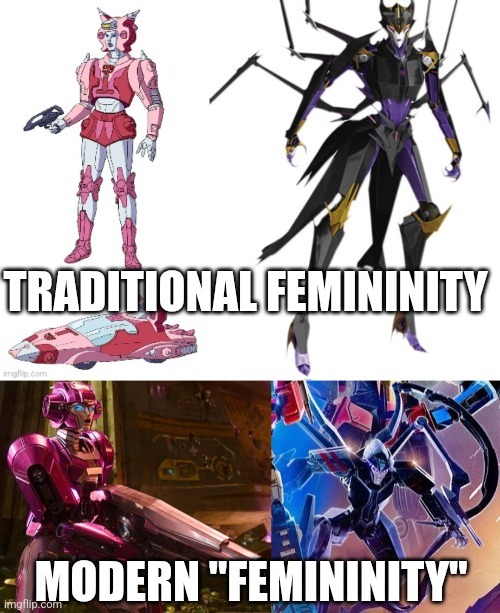
If you're surprised that I'm still worked up about this film, you're following the wrong blog. I'll say this once, and I won't repeat myself:
If you won't take criticism for this movie, keep scrolling. Otherwise, you'll just bring this on yourself.
Now, about the above women.
Transformers as a franchise has had female characters long before Arcee ever showed her face onscreen. Debuting roughly in the middle of the second season of Transformers G1, we are introduced to six female Autobots still living - or rather, surviving - on Cybertron. Of those six, four are named and have speaking roles: Elita One, Chromia, Firestar, and Moonracer. They are quickly shown to have distinct personalities that, while rough (Chromia) or seasoned (Firestar), are still recognizably feminine in how they regret a mistake and nurture the ones under their care (Moonracer and Elita respectively.) Additionally, their appearance is notably feminine too, and while it may be "exaggerated" for a robot lady, it's not done with malice. Rather, it's done to show that while these women are tough and have fought for millions of years, they are still women. They are not women in male bodies, like Strongarm from RID 2015 (and who had the gall to take her name from a preexisting male character), but they are fighting to take back their home, and are patiently waiting for the time they can lay down their weapons and return to the life they naturally desire - primarily, that of caretakers and mothers.
In other words, they fight because they want to have families in a safe home and will do so to achieve this dream alongside the men.
Elita One is a spectacular example of this line of thought. Take a look below for roughly five minutes to see her original characterization.
youtube
Elita is an Autobot commander who has shouldered the responsibility of fighting for her homeworld in the absence of her leader and man for four million years.
Yet, it did not make her cold and aloof.
Rather, it only made her natural maternal side and kindness grow. She knew that she had to fight Shockwave and his forces on Cybertron and that it would be difficult, but she was not going to let them break her spirit. She would and did not let them take her femininity from her, for that would be just as much of a win for them as killing her and the others. The Decepticons want a new world order, which would also entail destroying the old order of society. Elita, as a woman, will not let that happen, for then not only is there no more safety and social order on Cybertron that would put any family she could have at risk, it is also denying her her right to be a woman who is as capable on the battlefield as she is tending house (which, let me tell you, takes the same grit and determination as a man going to work to support the family.)
Elita wants to have a family, as do her fellow female Autobots (Chromia hugging Ironhide should tell you how much that iron lady missed her man), and if that means taking up arms until they can return to a normal society, then by golly she will do so. She fights to protect and defend; it is not in her nature to fight anymore than it is in Optimus' nature. It is simply what she must do until the war is over, and when it ends, she will leave the battlefield behind her as Optimus will.
Elita is a kind, warm, motherly woman. She will help pull you out of the darkness of despair and will hug the pain away. She is a mother, and deep down she will fight if she has to, but she will only do so if all else fails.
Yet what does Transformers One do to her?
youtube
youtube
If the title of that first clip alone doesn't show you what Elita was reduced to, then maybe the clip of her childish scream will.
Instead of a motherly, feminine woman, Elita is gutted all the way to her marrow and filled with the poisonous traits of all modern "strong female characters" - namely that she is a career focused woman who needs no man unless it's to belittle him for his imperfections/limitations/perceived idiocy. The only difference is that Elita is somehow written to seemingly develop feelings for her male subordinate Orion Pax, though the story takes great pains to show that she "dominates" the partnership with Orion/Optimus, something that is a gross disservice to her and Optimus.
All of this is a destruction of Elita's characterization. They ripped her feminine qualities for a modern misconception of what women must be in order to "make her relevant".
And it's not just Elita. It's also another, though newer, female Transformer.
youtube
Airachnid, though absolutely sadistic and a cold-blooded killer who revels in murder and carnage, is still feminine. In fact, she perfectly embodies warped femininity used to allure, entice, and bend men to her whim. She has a certain "dark charm" that even Breakdown finds attractive for a short while. This is a natural feminine wile that Airachnid uses to her advantage whenever she gets the chance, or to simply flaunt her attractiveness for kicks. This is what most evil women in fiction and real life do, because why lift a finger when you can charm a man into doing the heavy lifting?
Now, we come to her in Transformers One.
youtube
Ignoring for a moment that she looks like every post 2015 cartoon's cut and dry "non-binary" character, the writers completely drained Airachnid of her agency. She's supposed to be the femme fatale that uses her femininity to get what she wants and remains on no side but her own. But instead of keeping that, instead of having a dangerous third party who could even be a chessmaster playing both sides for grins and giggles, her femininity is sucked out of her and she's given the role of bodyguard who does nothing but follow Sentinel's orders and fight in a very bland way that is the most gender-neutral I've ever seen in a character.
What happened to the female psychopath who fought like a woman? I hated her, but in the sense of "I hope she dies", not "gets neutered like a dog".
All of this is a travesty and a slap in the face. This movie is telling us that female Transformers, or even females in general, must be cold, snappish women focused on only the work and never once consider having a family that women naturally yearn for. This is a toxic notion that has obviously permeated the fictional world for a little over ten years, and this movie shows that it's not slowing down.
I don't care that all the fans are going gaga over the plot or whatever they're talking about nowadays with this flick. All I care about is that we got female characters stripped of their femininity in Transformers. It should never have happened, here and in other stories.
Get offended, incensed, and screamy all you want over my post. I'm beyond the point of giving an English damn about what you think and say of this film.
It's an insult to me and to the women of this franchise. They're independent without having to put down the men, memorable without having romantic or with romantic connection to their male allies, and fun without being "haha, strong girl go brr". The fact that you all feel the need to shove this poison down our throats tells me how insecure the lot of you are, and I'd pity you if my veins didn't burn like Hades' rivers right now.
Don't bother speaking to me of this ever again. I'm done. Yes there was good in it, but it came too little, too late. And frankly, it came in the wrong packaging - heh, pardon the pun.
I refuse to engage with anything Hasbro churns out until another five, maybe ten years from now. Perhaps by then it'll have collapsed in on itself and a brighter future for it risen from the ashes, I don't know.
So long - and enjoy these fan produced songs that grant the Transformers' ladies more honor, dignity, and respect than Hasbro could ever dare dream of matching.
youtube
youtube
youtube
#Youtube#criticism#art critique#transformers#transformers one#transformers prime#maccadams#transformers g1#transformers fanart#tfp#tfp optimus prime#tfp megatron#tf prime#maccadam#tf one#tf one elita#elita one#oplita#elita 1#b 127#tf elita one#tfp airachnid#tf one airachnid#tf one alpha trion#tf airachnid#tfp arcee#tf arcee#femininity#optimus prime#orion pax
193 notes
·
View notes
Note
Thank you for writing Long Live Evil.
I'm no cancer survivor, so I haven't been through the horror that that must've been, congratulations to enduring and surviving, and my sincere condolences that you had to go through it.
But I am chronically ill (cystic fibrosis, genetic defect) and have so far lived for 5 years longer than my prognosis allowed. My health's been good and stabile for a long time now, but I remember times where I couldn't walk alone, had a 18/6 nasal cannula and a 24-hour IV drip instead of school or a future.
Now I'm working at university, an archaeologist, chipping away at writing stories for years and years, and incredibly glad and privileged to see the world. All this to say that seeing how hurt Rae was in the beginning (and again throughout the story, while also never truly forgetting her true roots and motives) and how she grew around it like a gnarled tree, was like catharsis for me. Having miraculously given a second chance, no matter how hard the fight to keep it will be; I haven't ever read any story talking about this in a way that made me feel seen and understood like this. Thank you also lots and lots for taking the time to mention Rae's appreciation for Rahela's curves — it's been the same for me, since I've managed to get out of the underweight-trap. It means a lot to me, and I guess to many others in similar situations, including you of course. Thank you for sharing this with us, it must've been hard to touch on a deeply personal experience like this in writing that's simultaneously removed from oneself through fiction (at least that's what I'm imagining).
Thank you, and I wish you nothing but the best, health, and lots of good days to come. Deeply curious to see how Rae's story will continue!
Thank you so much for this.
I am so glad you are alive. Thank you for that, too - for living on even when you couldn’t see a way forward and everything was helpless despair.
I haven’t been through what you’ve been through, either, but it’s a privilege to have shared adjoining experiences trapped in darkness, and to share gladness and the wide world with you now. I’m so sorry it happened, and so happy you have archaeology and stories, and the world has you.
I will be totally honest and say it has been hard sharing Long Live Evil with the world, and I’m so grateful to you for knowing that, and for sending this message because you knew. This book is highly personal to me, but it’s also meant to be a wild celebration of messiness, escapism, and finding humour in art and darkness. And that means to some it’s just a joke, and in the words of Joanna Russ, ‘she’s not really an artist and it’s not really art.’ And so it gets dismissed, and it does hurt to see my most important story dismissed sometimes.
I was with other writers in a public space at one point and they were talking about how their books were about serious issues while ‘Sarah’s book is just for fun, and that’s fine too!’ (I had to take a minute before I could lean into my microphone and say ‘My book is about cancer’ in a cheery tone.) I’ve seen readers saying ‘this book’s just fluff, just silly, I’m ashamed of myself for reading it, there’s nothing to it’ about the book I wrote about almost dying.
My Rae, while of course she has bits of me in her (every character I’ve ever written does), and evil queens I’ve loved, and characters with wild hubris going on in the Greek plays I mention often in the book, and readers I’ve seen and I’ve been who are blithely confident they know what’s going on without doing more than surface reading and while forgetting key details… she’s also bits of women and girls I’ve mentored, been mentored by, befriended. And some of them are dead. So seeing the bits that were them particularly scorned or judged, seeing her pain dismissed or the discussion of her body sneered at…
That has been hard.
But.
In the end I believe I am really an artist and this book is really art, and art is there for the wide world to judge - to be mocked and dismissed, yes, as a price that comes with the opportunity to also be truly seen and appreciated, to get to influence real people’s real lives. Art is the gold that comes from the crucible in which we put all our pain and all our love and all our joys. I believe it deepens and transforms.
I wrote this book about how deeply unsympathetic people actually are to sufferers of illness, chronic or otherwise, and especially to women expressing pain. How the world villainises imperfect victims—which means all victims. How the world villainises bodies, and robs us of our joy in them—even when there’s horror in a body, too. I did know that by putting this book out into this world, that attitude would be reflected back by the world onto the book. And that attitude has hurt me in the past, and hurts me when I see it now.
I still think it’s worth calling out that attitude, even if it means getting more of that attitude reflected back onto me - because it means readers like you see it, and know others have been through this, and it was never okay, and you were never alone. While I know there will also be readers with chronic illnesses and/or cancer whose experience doesn’t overlap with mine at all, that only means there need to be more stories. So everyone who needs it gets the map into fantasy lands.
And I do hope some able-bodied readers read it, and think twice about adopting the world’s attitude to the people in their lives who are already going through enough. Some readers have told me the book helped them sympathise with and understand the cancer sufferers in their family and friend circles, and that’s meant a great deal. What do we write for, if not to learn to love each other better?
Long Live Evil has also given me my life back, as truly as chemo did, in a way that makes the pain worthwhile - I think I would have kept telling stories in some form, but Long Live Evil was my last throw, for as far ahead as I could see. Now since the book’s done well so far I’m hoping I can write more books, and my life can be the storytelling shape I always wanted it to be.
I read your message and I regretted nothing. I remember the pain and the way so many of us laughed or tried to laugh our way through it, and I know this was my way. Jokes, like stories, are the golden thread we follow through the dark labyrinth of our own agony and incomprehension.
It really has been hard, and it’ll stay hard. But like living, it’s worth it.
Please know two things.
I am so happy I wrote this book. Ultimately more than any other feeling I had so, so much fun writing it, and I’m having even more fun seeing the book be read by the people it was meant for.
2. This book was written for you.
#long live evil#chronic illness#cancer#epic fantasy#isekai#books and reading#criticism#portal fantasy#rae parilla#body horror positivity
253 notes
·
View notes
Text

Out of four consecutive Disney Villains that were defined by plot twists regarding them, I've often thought: what made Turbo and the Cybug he merged with in Wreck-It Ralph work out so well and deliver a villain so infinitely stronger than the villains that followed? I'd concluded that mostly it was because Turbo got to be around as an active and characterized antagonist as King Candy and the twisty nature of his villainy was more comparable to Judge Doom than following the Stinky Pete, Henry J. Waternoose, and Lyle T. Rourke route of only being revealed as a villain in the third act and getting to be actively antagonistic for a limited time while taking on drastically different characterization than before like the later Twist Villains (or in Bellwether's case, in only the final minutes of the third act!).
But there was something else too, and it recently struck me.
Hans, Callaghan, and Bellwether all adhere to basically the exact same formula, with only the specifics of their roles differing due to each movie being a different type of story - Frozen is a fantasy adventure-thriller, Big Hero 6 is a superhero story, and Zootopia is a buddy cop mystery. The formula is that not only is the villain introduced as a friendly character in the first act and ultimately shows their true villainous self in the third act, but during the story there's another villainous character thrown at the viewer to serve as the red herring. In Frozen, it's the Duke of Weselton. In Big Hero 6, it's Allister Krei. And in Zootopia, it's Mayor Lionheart. All of these characters seem more like the sort of villains you'd typically expect to pop up in stories of these films' natures, radiating such obvious evil energy that the viewer is naturallly meant to have their suspicions drawn to them rather than the unassuming nice person who turns out to be the real villain of the piece. I'd argue it worked best when first tried in Frozen because the Duke ended up having absolutely nothing to do with the main conflict or how it got resolved, his main contribution being to tell two men to be prepared to kill Elsa at one point and that's it: he was a red herring in the purest sense. With Krei and Lionheart afterwards, they both had increased prominence in the narrative, the former being responsible for what drove Callaghan into grief-stricken, vengeful supervillainy, and the latter at first being Bellwether's boss and actually serving as a secondary antagonist in the plot with his unethical captures and coverups in response to Bellwether's Night Howler conspiracy. And they both are such obvious suspects for being behind evildoing even in-story that it loops around to becoming obviously NOT the true culprits at all. (Not helping is how both the Duke of Weselton and Allister Krei are voiced by Alan Tudyk, at the time still most known for King Candy/Turbo!)
Whereas with Turbo, I think it was so effective because it was sort of flipped around. The story was leading us to look at King Candy as the red herring or ultimately just the diversion, continuing to remind us that the Cybug that Ralph accidentally brought with him into Sugar Rush was lurking below and breeding, which we knew could become a true threat to the game and to the whole arcade world given the way Calhoun talked the Cybugs up. Even when Felix goes into the backstory of "Going Turbo", we're not really linking that to what's currently going on with King Candy, who we at that point had not been given reason to think is anyone but who he appears to be, and King Candy's such a silly, whimsical doofus of an antagonist that we suspect he'll amount to nothing more than food for the Cybugs. How King Candy goes on to manipulate Ralph and the revelation about him as a usurper turns our perspective of him on its head as is, but then it's revealed he's not just any usurpeeeer - he's Turbo! This on its own makes him that much more villainous, but then still we get the kicker: Turbo gets eaten by the lead Cybug, just as we might've predicted would befall him....and his code overwrites the Cybug from within, making him even more dangerous and malicious than ever! So while the Cybugs do indeed become the endgame threat, they're also used as the actual diversion to get you not looking harder at King Candy and figuring out both his true identity and his true nature as the primary, most menacing villain in this story. It is ingenious.
Pulling off a Twist Villain is easy. It takes a lot more thought, skill, style and polish to pull off a Turbo-Tastic villain as Wreck-It Ralph did.
#Disney#disney villains#Wreck-It Ralph#Turbo#King Candy#Frozen#Prince Hans#Big Hero 6#Yokai#Robert Callaghan#Zootopia#Dawn Bellwether#Mayor Bellwether#plot twist#opinion#criticism#comparison#analysis
268 notes
·
View notes
Text
I remember during the making of Tangled, the filmmakers said they had to work hard to design Rapunzel’s tower to be beautiful and seem like a cozy, fun environment, while also making Mother Gothel seem sweet and loveable, if manipulative.
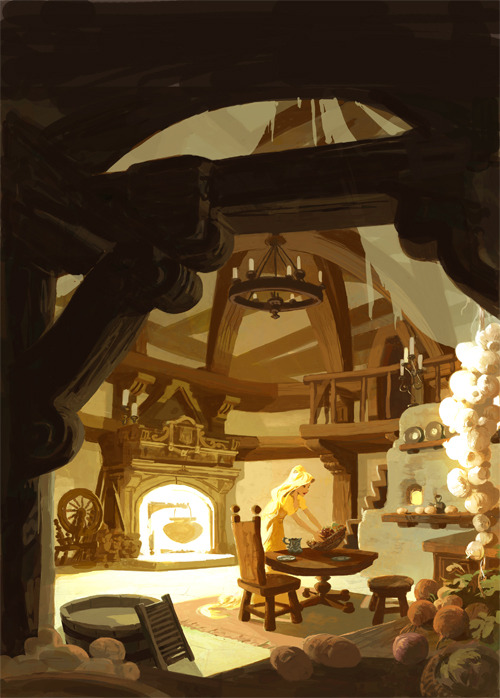
Because, they said, if the environment is too much like a prison, and Gothel is too much like a villainess, the audience wouldn’t believe in Rapunzel as a character. They’d think she was either stupid or cowardly, to stay in such a nasty situation without trying to escape sooner. But if her circumstances seem just livable enough, just sweet enough, that you can see some of the appeal, then you wouldn’t blame her for waiting so long to leave.
Why didn’t they do that with Wish?
Why didn’t they think that relatability through?
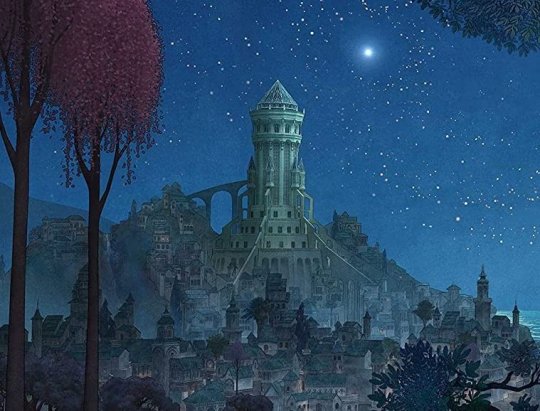
Nobody is really feeling compelled to root for the everyday Rosas citizens during the movie. You don’t feel like rooting for Asha’s cause, or even Queen Amaya’s. Because you think to yourself, “why did it take the townspeople so long to ask the question ‘why can’t we just have our wishes back?’”
Asha comes up with those culture-breaking questions, inexplicably, in the first twenty minutes of the movie. It takes the rest of the townspeople about 24 hours to suddenly start asking that, too.
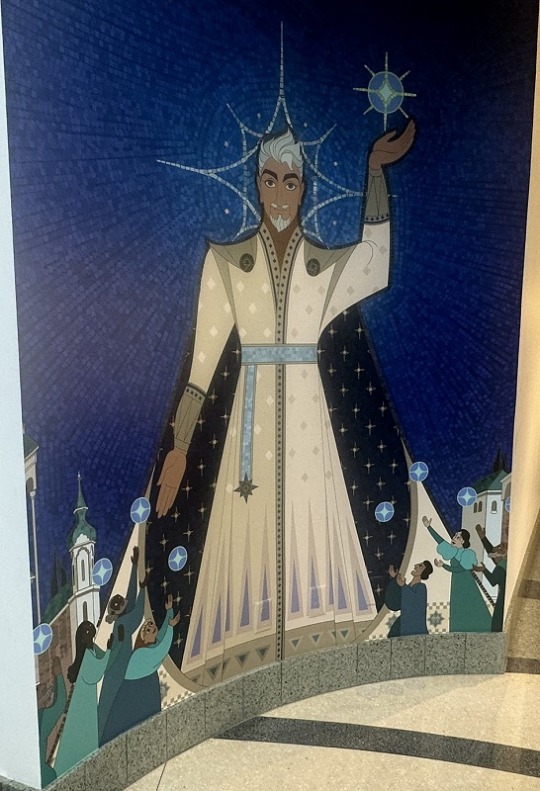
So why don’t you root for them?
Because when something bad happens to them, part of your brain goes, “why didn’t they see that coming, though? Why didn’t they ask questions? That one’s a little bit on them.”
And you don’t really feel that feeling you got with Mother Gothel, where you were like, “Oh yeah, I can see why the main character trusted this villain; the villain really seems to care about the hero, if you didn’t know what she was after.” You don’t;t get that same feeling with Magnifico. Because the whole idea of what he does—by erasing people’s memories and yelling at them and having no moments with regular folk where he’s warm and personal and building trust—is so malicious that we don’t believe the other characters couldn’t see it.
We COULD HAVE believed it. If they’d added in good writing and character moments to make it believable.
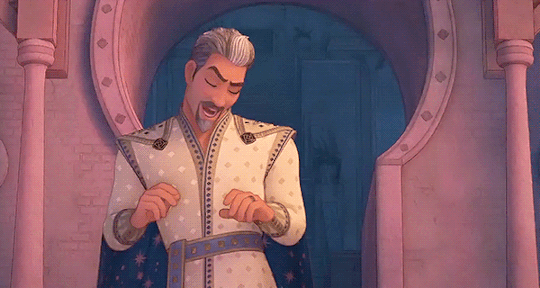
When Magnifico interacts with the people who trust him and are duped by him, he’s up on a stage, flashing superpowers they don’t have and then disappearing back into his tower after only granting one wish. He’s not on the welcome tour with Asha. He doesn’t know his own palace staff by name. He’s done nothing to build the trust all the side-characters unquestioningly give him. So even at the end, when everyone’s like, “aw, we wanted to believe in Magnifico,” we don’t feel it. Because didja? Why? Everyone could see that coming.
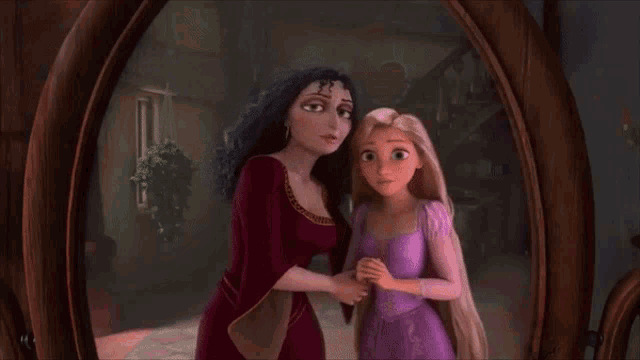
Meanwhile Mother Gothel tells Rapunzel she loves her most every time she leaves. She laughs with her. She reinforces every conversation they have with the idea that she’s desperate to protect Rapunzel. She brings her her favorite soup as a surprise and remembers the ingredients. She goes to get white paint on a very long trip so Rapunzel can paint. She compliments her strength and beauty—even if it’s backhanded. She calls her “dear,” and “darling.” She knocks thugs out with sticks, returning even after she argued with and supposedly ‘gave up’ on Rapunzel, all to supposedly’ protect’ her. So when Rapunzel realizes it was all an act, and she’s wrathful and furious and grabs Gothel’s hand, we DO feel it. Because we believed that Rapunzel really didn’t see this coming, so the shock stings worse. We don’t blame Rapunzel, and we do blame Gothel.
Just another example of what #NotMyDisney forgot about themselves.
#Tangled#wish#Gothel#mother Gothel#rapunzel#asha#Magnifico#wish hate#meta#conceit Art#criticism#analysis#character development#writing tips#character analysis#animation#Disney#NotMyDisney
566 notes
·
View notes
Text
Thinking about Wrath of the triple goddess again and I just saw the interview Rick made and-
He openly says that he is mixing up two canons together, how he gets inspired by the "actors" and their dynamics. I read @lilislegacy 's criticism again and I just dont know how would we handle new books if he just keeps doing it. Because we saw the results, we saw how ooc characters become, we saw how it felt like Rick didnt read his own books for years and actually this is funny:
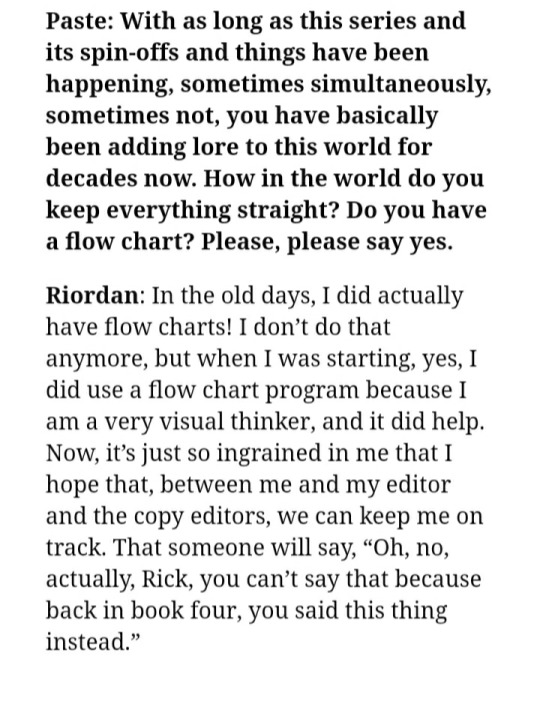
Just read your own books...And like, missing every detail even big ones or the ones we kept in our hearts for years(Annabeth's lemon shampoo...) is gone! Like what are you on?
This is why I always believe, if you make an adaptation, keep them separate from the canon material, in this case, books. It is hurting the both of them. Also this is the reason I personally dont like any mixing in the arts or in fanfics. I respect who does or prefer, but for me, universes need to stay separate or we have this situation in our hands.
Show and the books are so so so different, they deserve to be their own things. Show deserves to have its own canon, own events, actors need to have their own development. While books should stay books and book characters should stay book characters. Like please, book characters and show characters are different. We cant pretend the otherwise, we just cant. You cant tell me Walker is exactly book Percy, Leah is book Annabeth or Aryan is book Grover. They are all amazing, yes. We should support them, also yes. But pretending they are the book characters, that they are the exact same is just a big no.
Rick trying to write the actors' dynamics into the new books felt so ooc! And anyone who is hyping "Oh he imagining them as he writes", you cant see how ooc they were? And someone should tell Rick that. I dont know how to reach that man, he loves keeping himself away from the fans. But someone gotta let him know because the new books feels nothing but cash grabs. Amount of typo mistakes, ooc characters, all the stupid advertasing for the S2. So so cringe :(
I really dont want new book to be the same and I really dont know what to do *sigh* It hurts to see the man, who I admired for my whole childhood, getting so so much hate from the fans, but it is getting so hard to defend him, he is turning to JK.Rowling and it is creepy :(
#its a big no no#rick riordan#criticism#annabeth chase#percy jackson#grover underwood#pjo#hoo#aryan simhadri#leah sava jeffries#walker scobell#wottg
231 notes
·
View notes
Text
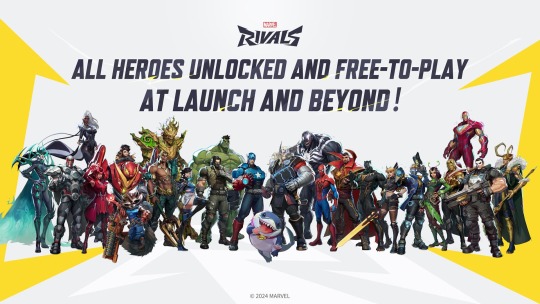
My G-d, why does all the human males have large border shoulders and huge while the women are slim, showing a lot of skins, and having their breasts protubed more outwards. The character design of Rivals is mainly this meme.
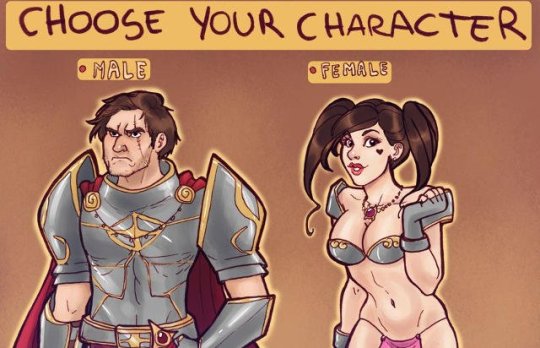
#marvel#marvel rivals#criticism#Spiderman#peter parker#peni parker#SP//dr#wolverine#logan wolverine#x men
232 notes
·
View notes
Text
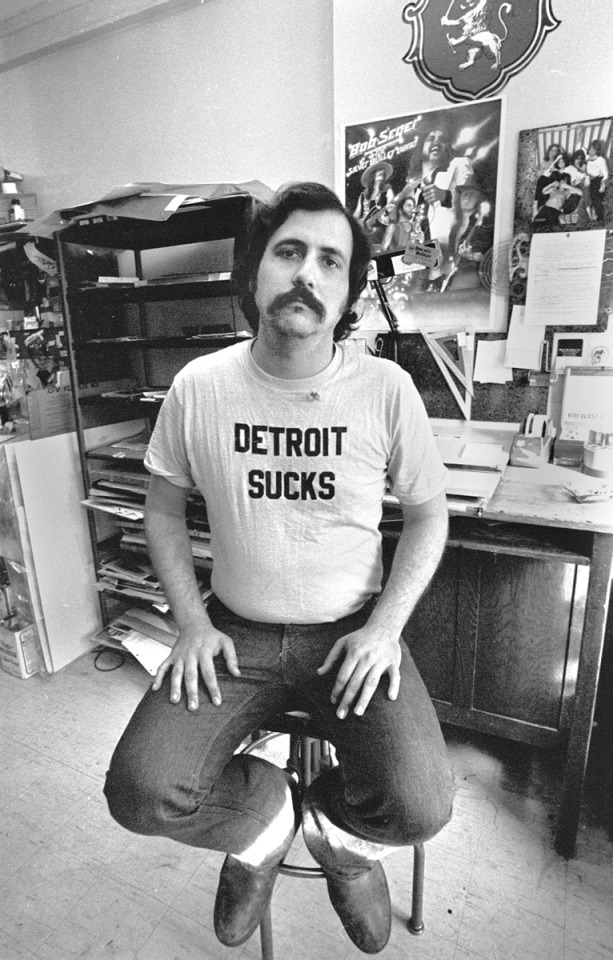
Lester Bangs, December 14, 1948 – April 30, 1982.
229 notes
·
View notes
Text
Dionysus as a festival god can simultaneously invert and subvert these cultural categories: language, the role of the sexes, classes, and political hierarchy. To understand Dionysus is to understand that the order imposed upon the world by human culture is created by that culture, and that the permanent potential exists for a reversal or collapse of this order. To accept him is to understand that festival and ritual can offer this knowledge in a form that ultimately supports rather than destroys the existing social structure.
Helene P. Foley, Ritual Irony: Poetry and Sacrifice in Euripides
#dionysus#classics#criticism#this may sound obvious now but it's only because we all take the work of this book for granted 50 years on
199 notes
·
View notes